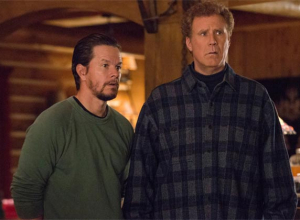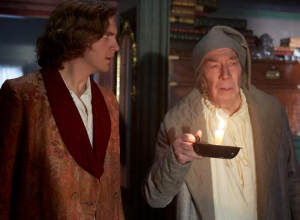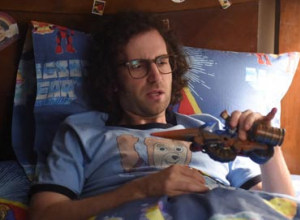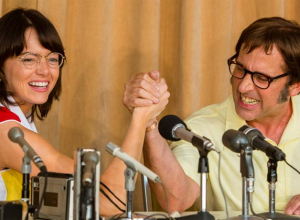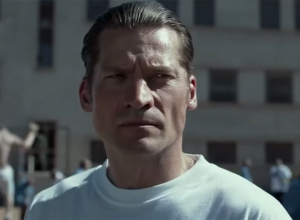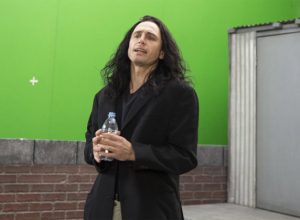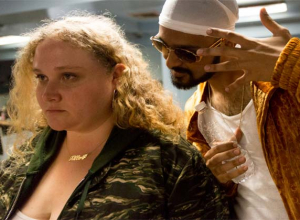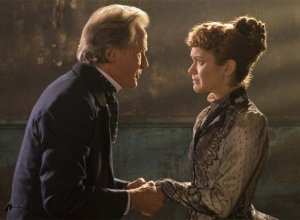Pollock Review
By Jonathan Curiel
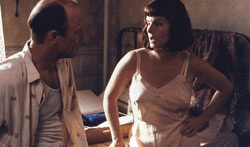
A good example: Pollock was suicidal, maniacal and violent throughout his 44-year life. The first sentence of Naifeh's and Smith's book -- the very first sentence -- is this quote from Pollock: "I'm going to kill myself." Explains a lot, but for some odd reason, Harris only hints at Pollock's suicidal tendencies in his long-anticipated film.
What Harris does best is show us Pollock painting. Over and over, we see Harris dripping paint on large canvases and throwing around the oils like they were enemies that need to be splattered dead. Reds, yellows, blues, and grays come alive in Pollock, letting viewers exhilarate in the glory of creating great abstract art. For people not familiar with Pollock's paintings, Harris' movie will be a revelation. Much of the movie was filmed on Pollock's former Long Island estate, where he did his most celebrated work. Harris, who directed himself, deserves praise for effectively recreating Pollock's last years and for learning to actually paint like Pollock. Harris isn't faking it when he hunches over a blank canvas and splashes paint everywhere.
Harris is also good at capturing some of Pollock's notorious rages. It's chilling when Harris starts yelling at a pushy filmmaker and practically stalks him to the family dinner table, telling him, "I'm not the phony! You're the phony! I'm not the phony! You're the phony!" There is genuine fear in that scene, and it was fear that followed Pollock from his birth in 1912 to his death in 1956.
In the role of Lee Krasner, Pollock's wife, Marcia Gay Harden is perfect. With her thick, New York accent and controlling tendencies, Harden's Krasner helps drive Pollock's artistic career at a crucial period. Unfortunately, there is no context. Krasner wasn't the only one who propped up Pollock. Though patron Peggy Guggenheim, brother Sande Pollock, and art critic Clement Greenberg are portrayed in Pollock, missing are the long line of backers that date back to Pollock's early years. Where are artists Thomas Hart Benton and John Graham, whose influence on Pollock is well-chronicled in Naifeh's and Smith's book? And where are the legions of therapists and doctors who worked with Pollock for so many years -- therapists and doctors who tried getting Pollock to open up about his sexual confusion, his love-hate relationship with his mother and his lifelong abuse of alcohol?
None of that is in the movie, which begins in 1941, when Pollock is 29 and starting to make a name for himself. Pollock ends with a written note about Pollock's and Krasner's life, but -- at the very least -- the film should have started with a written note about Pollock's early years, when his dysfunctional family formed his sense of self. Too bad. Harris had a good chance to flush out the real Jackson Pollock. Instead, we get an interesting glimpse of the man who became "America's first art star."
A final note: Over the years, many people apparently told Harris that he looks like Pollock, and he does. The physical resemblance may be one reason Harris was so devoted to making this film. (It took 10 years to bring Pollock's life to the big screen.) So obsessed was Harris that he put on 30 pounds to accurately portray Pollock's heavyset last year of life. Like Elvis and other artists, Pollock's weight gain was a portent of a greater physical breakdown.
Pollock gets an earful.
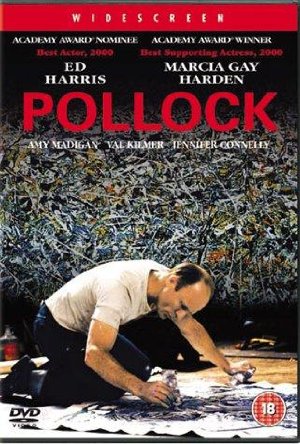
Facts and Figures
Year: 2000
Run time: 122 mins
In Theaters: Friday 18th May 2001
Box Office USA: $7.3M
Distributed by: Sony Pictures Classics
Reviews
Contactmusic.com: 3.5 / 5
Rotten Tomatoes: 81%
Fresh: 87 Rotten: 20
IMDB: 7.0 / 10
Cast & Crew
Director: Ed Harris
Producer: Fred Berner, Ed Harris, Jon Kilik
Screenwriter: Barbara Turner, Susan J. Emshwiller
Starring: Ed Harris as Jackson Pollock, Marcia Gay Harden as Lee Krasner, Tom Bower as Dan Miller, Jennifer Connelly as Ruth Kligman, Bud Cort as Howard Putzel, John Heard as Tony Smith, Val Kilmer as Willem DeKooning, David Leary as Charles Pollock, Robert Knott as Sande Pollock, Stephanie Seymour as Helen Frankenthaler
Also starring: Amy Madigan, Jeffrey Tambor, Fred Berner, Jon Kilik, Barbara Turner

